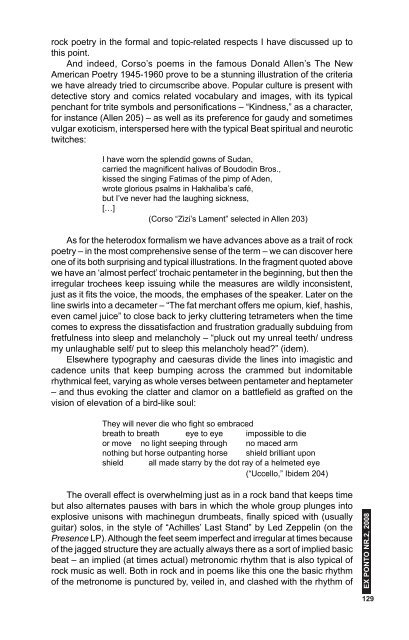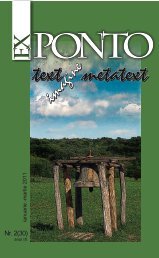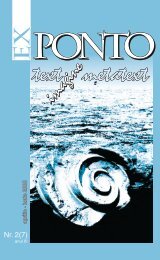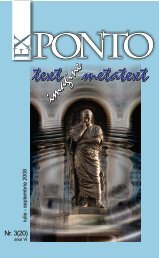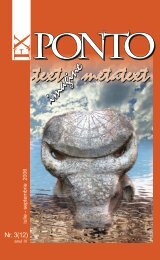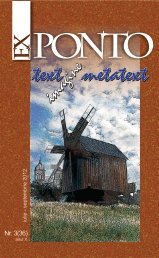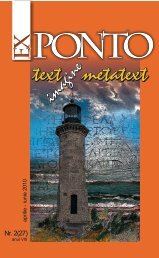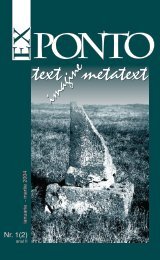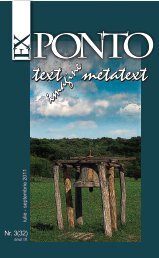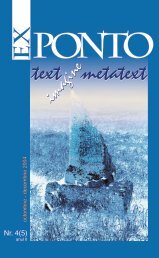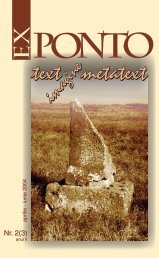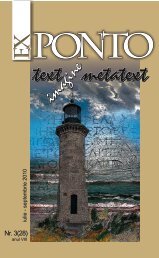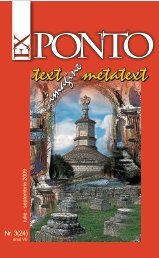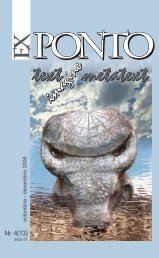Nr. 2 (19) anul VI / aprilie-iunie 2008 - ROMDIDAC
Nr. 2 (19) anul VI / aprilie-iunie 2008 - ROMDIDAC
Nr. 2 (19) anul VI / aprilie-iunie 2008 - ROMDIDAC
You also want an ePaper? Increase the reach of your titles
YUMPU automatically turns print PDFs into web optimized ePapers that Google loves.
ock poetry in the formal and topic-related respects I have discussed up to<br />
this point.<br />
And indeed, Corso’s poems in the famous Donald Allen’s The New<br />
American Poetry <strong>19</strong>45-<strong>19</strong>60 prove to be a stunning illustration of the criteria<br />
we have already tried to circumscribe above. Popular culture is present with<br />
detective story and comics related vocabulary and images, with its typical<br />
penchant for trite symbols and personifications – “Kindness,” as a character,<br />
for instance (Allen 205) – as well as its preference for gaudy and sometimes<br />
vulgar exoticism, interspersed here with the typical Beat spiritual and neurotic<br />
twitches:<br />
I have worn the splendid gowns of Sudan,<br />
carried the magnificent halivas of Boudodin Bros.,<br />
kissed the singing Fatimas of the pimp of Aden,<br />
wrote glorious psalms in Hakhaliba’s café,<br />
but I’ve never had the laughing sickness,<br />
[…]<br />
(Corso “Zizi’s Lament” selected in Allen 203)<br />
As for the heterodox formalism we have advances above as a trait of rock<br />
poetry – in the most comprehensive sense of the term – we can discover here<br />
one of its both surprising and typical illustrations. In the fragment quoted above<br />
we have an ‘almost perfect’ trochaic pentameter in the beginning, but then the<br />
irregular trochees keep issuing while the measures are wildly inconsistent,<br />
just as it fits the voice, the moods, the emphases of the speaker. Later on the<br />
line swirls into a decameter – “The fat merchant offers me opium, kief, hashis,<br />
even camel juice” to close back to jerky cluttering tetrameters when the time<br />
comes to express the dissatisfaction and frustration gradually subduing from<br />
fretfulness into sleep and melancholy – “pluck out my unreal teeth/ undress<br />
my unlaughable self/ put to sleep this melancholy head?” (idem).<br />
Elsewhere typography and caesuras divide the lines into imagistic and<br />
cadence units that keep bumping across the crammed but indomitable<br />
rhythmical feet, varying as whole verses between pentameter and heptameter<br />
– and thus evoking the clatter and clamor on a battlefield as grafted on the<br />
vision of elevation of a bird-like soul:<br />
They will never die who fight so embraced<br />
breath to breath eye to eye impossible to die<br />
or move no light seeping through no maced arm<br />
nothing but horse outpanting horse<br />
shield<br />
shield brilliant upon<br />
all made starry by the dot ray of a helmeted eye<br />
(“Uccello,” Ibidem 204)<br />
The overall effect is overwhelming just as in a rock band that keeps time<br />
but also alternates pauses with bars in which the whole group plunges into<br />
explosive unisons with machinegun drumbeats, finally spiced with (usually<br />
guitar) solos, in the style of “Achilles’ Last Stand” by Led Zeppelin (on the<br />
Presence LP). Although the feet seem imperfect and irregular at times because<br />
of the jagged structure they are actually always there as a sort of implied basic<br />
beat – an implied (at times actual) metronomic rhythm that is also typical of<br />
rock music as well. Both in rock and in poems like this one the basic rhythm<br />
of the metronome is punctured by, veiled in, and clashed with the rhythm of<br />
Ex Ponto nr.2, <strong>2008</strong><br />
129


